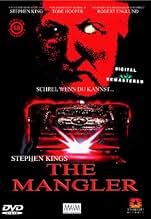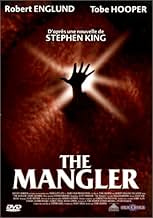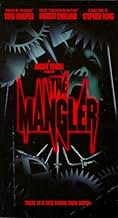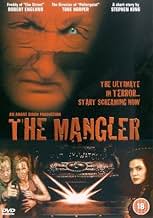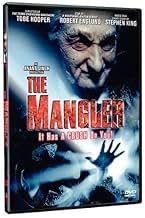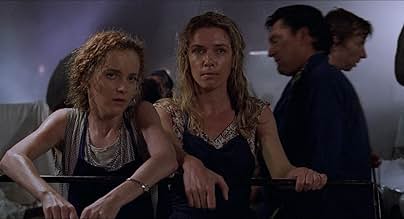NOTE IMDb
4,4/10
10 k
MA NOTE
Des ouvrières du textile sont victimes d'une essoreuse grand forma. Un inspecteur de police, un peu paumé, va tenter d'y mettre un terme.Des ouvrières du textile sont victimes d'une essoreuse grand forma. Un inspecteur de police, un peu paumé, va tenter d'y mettre un terme.Des ouvrières du textile sont victimes d'une essoreuse grand forma. Un inspecteur de police, un peu paumé, va tenter d'y mettre un terme.
- Réalisation
- Scénario
- Casting principal
- Récompenses
- 1 victoire au total
Avis à la une
I'm one of those who believe that Stephen King owes a very large debt of gratitude to H.P. Lovecraft (1890-1937.) In all fairness to King, though, he has graciously acknowledged Lovecraft's many important contributions to literary horror.
It's possible that director Tobe Hooper also recognized Lovecraft's significance when adapting The Mangler for the big screen. The short-story version does not offer a substantive historical link between the present-day and the genesis of the demon machine in the 1920s; the decade when Lovecraft began his short but illustrious writing career. Hooper took great pains, however, to develop an atmosphere that evokes the New England of Lovecraft's youth; a period when mill towns offered the only refuge for immigrants and native poor unable to make a living off the land. It was a time before the New Deal social reforms of President Franklin Roosevelt offered some relief from the exploitative and dangerous conditions inflicted on America's working class. For me, the philosophical sub-text of The Mangler is the evils of unbridled, industrial capitalism. The fact that rural communities have often depended for their very existence on a dehumanizing local industry is not lost on the socially progressive King.
Some have characterized The Mangler as an outstanding B-movie. I prefer to regard it as an all around entertaining flick. Although such films tend to be formulaic, Hooper and co-screenwriter Stephen David Brooks deserve credit for fleshing-out King's short story in a laudable fashion. The film's characters are well developed, and Robert Englund's portrayal of Bill Gartley, the grotesquely maimed, delightfully evil owner of the laundry machine from hell, should have earned him an Oscar nomination for Best Supporting Actor (a nod that should also have gone to Fred Gwynne for his fine work in Pet Sematary.) Ted Levine, and the versatile Jeremy Crutchley -- who portrayed two different characters in The Mangler -- also turned in noteworthy performances. Last but not least, the film's surprise ending, totally different from the climax of the original short story, is satisfying and appropriate.
Despite the overwhelming popularity of his novels, I believe that King's lesser works best demonstrate his creative gifts. The short story format demands an economy of words and a disciplined approach that can result in high emotional impact for readers. Short stories also provide additional latitude for movie makers to offer their unique interpretation of the work. The film adaptation of The Mangler is a fine example of the creative synergy between literary and cinematic artists, and a must-see for horror fans.
It's possible that director Tobe Hooper also recognized Lovecraft's significance when adapting The Mangler for the big screen. The short-story version does not offer a substantive historical link between the present-day and the genesis of the demon machine in the 1920s; the decade when Lovecraft began his short but illustrious writing career. Hooper took great pains, however, to develop an atmosphere that evokes the New England of Lovecraft's youth; a period when mill towns offered the only refuge for immigrants and native poor unable to make a living off the land. It was a time before the New Deal social reforms of President Franklin Roosevelt offered some relief from the exploitative and dangerous conditions inflicted on America's working class. For me, the philosophical sub-text of The Mangler is the evils of unbridled, industrial capitalism. The fact that rural communities have often depended for their very existence on a dehumanizing local industry is not lost on the socially progressive King.
Some have characterized The Mangler as an outstanding B-movie. I prefer to regard it as an all around entertaining flick. Although such films tend to be formulaic, Hooper and co-screenwriter Stephen David Brooks deserve credit for fleshing-out King's short story in a laudable fashion. The film's characters are well developed, and Robert Englund's portrayal of Bill Gartley, the grotesquely maimed, delightfully evil owner of the laundry machine from hell, should have earned him an Oscar nomination for Best Supporting Actor (a nod that should also have gone to Fred Gwynne for his fine work in Pet Sematary.) Ted Levine, and the versatile Jeremy Crutchley -- who portrayed two different characters in The Mangler -- also turned in noteworthy performances. Last but not least, the film's surprise ending, totally different from the climax of the original short story, is satisfying and appropriate.
Despite the overwhelming popularity of his novels, I believe that King's lesser works best demonstrate his creative gifts. The short story format demands an economy of words and a disciplined approach that can result in high emotional impact for readers. Short stories also provide additional latitude for movie makers to offer their unique interpretation of the work. The film adaptation of The Mangler is a fine example of the creative synergy between literary and cinematic artists, and a must-see for horror fans.
I picked this one up in a hurry six years ago and now it sits in my living room. I expected a snore-fest but was surprised by how the filmmakers made such a silly premise both entertaining and somewhat original. Odd cast as well: Freddy vs. Buffalo Bill? -and who is this Matmor character? This movie was an hour and a half of unapologetic misery with above average writing, performances and special effects at a time where Stephen Kings work was being pushed onto TV in the form of Diluted MOW garbage. Not for everyone, but in the eyes of a horror fan it is fair to say that it could be Tobe Hooper's best work in years.
Its not great but still entertaining when you don't know what to watch. I saw what i wanted to see, there are movies that tease you with "horror" but never show real juicy things, for example the movie "its alive" is about that baby creature but they never show us the baby, but this one did just enough. The only small problem i had was the characters are a bit cartoonish like the way robert englund's character speaks sounds too fake, we are far from freddy for sure. Besides all that, the story is entertaining because freak accidents like that can happen in real life and it gives me chills.
This is a B-movie through and through. Terminally flawed, but, if you let yourself, you can have a lot of fun watching it. Levine and Englund are both over-the-top and captivating, the plot, script and score are simple and stupid, but in a way that renders them unimportant. Just invite some buds over, get some beer and laugh as Robert Englund hobbles around cursing, Ted Levine pops pills and the machine folds people like sheets. Don't get me wrong, it's really bad and, at times confusing. But, while Tobe Hooper may have dropped the ball on this, he never kicks it out of the court. If you're looking for stupid fun, this is pretty solid.
The original short story by Stephen King is bizarre and terrifying. The idea of a possessed laundry-folding machine becoming sentient and homicidal sounds ludicrous, but it works in book form. Obviously, this is due to the titular horror being conjured in the mind of the individual reader.
As a movie it suffers on several fronts:
#1- The source material is only a few pages long, so, the movie had to be padded out to the extreme. This bloat adds nothing to the story, except for nonsensical side issues.
#2- The special effects necessary to make such a mechanical monster even remotely believable would cost many millions of dollars. This movie's microscopic budget made it look more like a poorly-realized cartoon.
#3- Director Tobe Hooper seems to have tried his best, but had very little to work with here. If there's ever been a tale that should remain only in our imaginations, it's THE MANGLER!
On the positive side: Robert Englund and Ted Levine are hilarious. This actually makes the movie bearable, bringing some much-needed mirth into this catastrophe. Their performances are so histrionic that the movie becomes a comedy...
As a movie it suffers on several fronts:
#1- The source material is only a few pages long, so, the movie had to be padded out to the extreme. This bloat adds nothing to the story, except for nonsensical side issues.
#2- The special effects necessary to make such a mechanical monster even remotely believable would cost many millions of dollars. This movie's microscopic budget made it look more like a poorly-realized cartoon.
#3- Director Tobe Hooper seems to have tried his best, but had very little to work with here. If there's ever been a tale that should remain only in our imaginations, it's THE MANGLER!
On the positive side: Robert Englund and Ted Levine are hilarious. This actually makes the movie bearable, bringing some much-needed mirth into this catastrophe. Their performances are so histrionic that the movie becomes a comedy...
Stephen King Movies Ranked by IMDb Rating
Stephen King Movies Ranked by IMDb Rating
See how IMDb users rank the feature films based on the work of Stephen King.
Le saviez-vous
- AnecdotesJim Cummings, the voice of iconic characters such as Winnie the Pooh, Tigger, Darkwing Duck, Pete, Ed the Hyena, Ray the Firefly, Hondo Ohnaka, Dr. Robotnik and a variety of other animated characters, provided the vocal effects for the titular machine and was glad to get to work with director Tobe Hooper, whom he was a fan of, but felt that the strain put on his throat by making the Mangler noises and the quality of the film itself wasn't worth the effort. He once saw the film on television and was amused to see that his name was misspelled as 'Tim Cummings' in the end credits, as it meant that he got paid to do a bad film and no one would even know he had been involved.
- GaffesMark incorrectly refers to a time in New England when witches were burned. This was actually a death sentence during medieval times in Europe, when someone was convicted of witchcraft. Colonial witch trials carried out the death sentence by hanging.
- Citations
Mark Jackson: Whats in this?
Officer John Hunton: I don't know, they're antacids, I got them from Mrs. Frawley.
Mark Jackson: [looking at ingredients on antacid bottle] Belladonna? You got these from Mrs. Frawley?
Officer John Hunton: The Hand of Glory?
Mark Jackson: I think... we may be fucked.
- Versions alternativesAvailable in an R-rated version and an Unrated "director's cut". The unrated version contains very graphic versions of scenes, including Mrs. Frawley's and Gartley's deaths.
- ConnexionsFeatured in The Adventures of Sebastian Cole (1998)
Meilleurs choix
Connectez-vous pour évaluer et suivre la liste de favoris afin de recevoir des recommandations personnalisées
Détails
- Date de sortie
- Pays d’origine
- Langue
- Aussi connu sous le nom de
- La presseuse diabolique
- Lieux de tournage
- Sociétés de production
- Voir plus de crédits d'entreprise sur IMDbPro
Box-office
- Montant brut aux États-Unis et au Canada
- 1 781 383 $US
- Week-end de sortie aux États-Unis et au Canada
- 933 809 $US
- 5 mars 1995
- Montant brut mondial
- 1 781 383 $US
- Durée1 heure 46 minutes
- Couleur
- Mixage
- Rapport de forme
- 1.85 : 1
Contribuer à cette page
Suggérer une modification ou ajouter du contenu manquant



